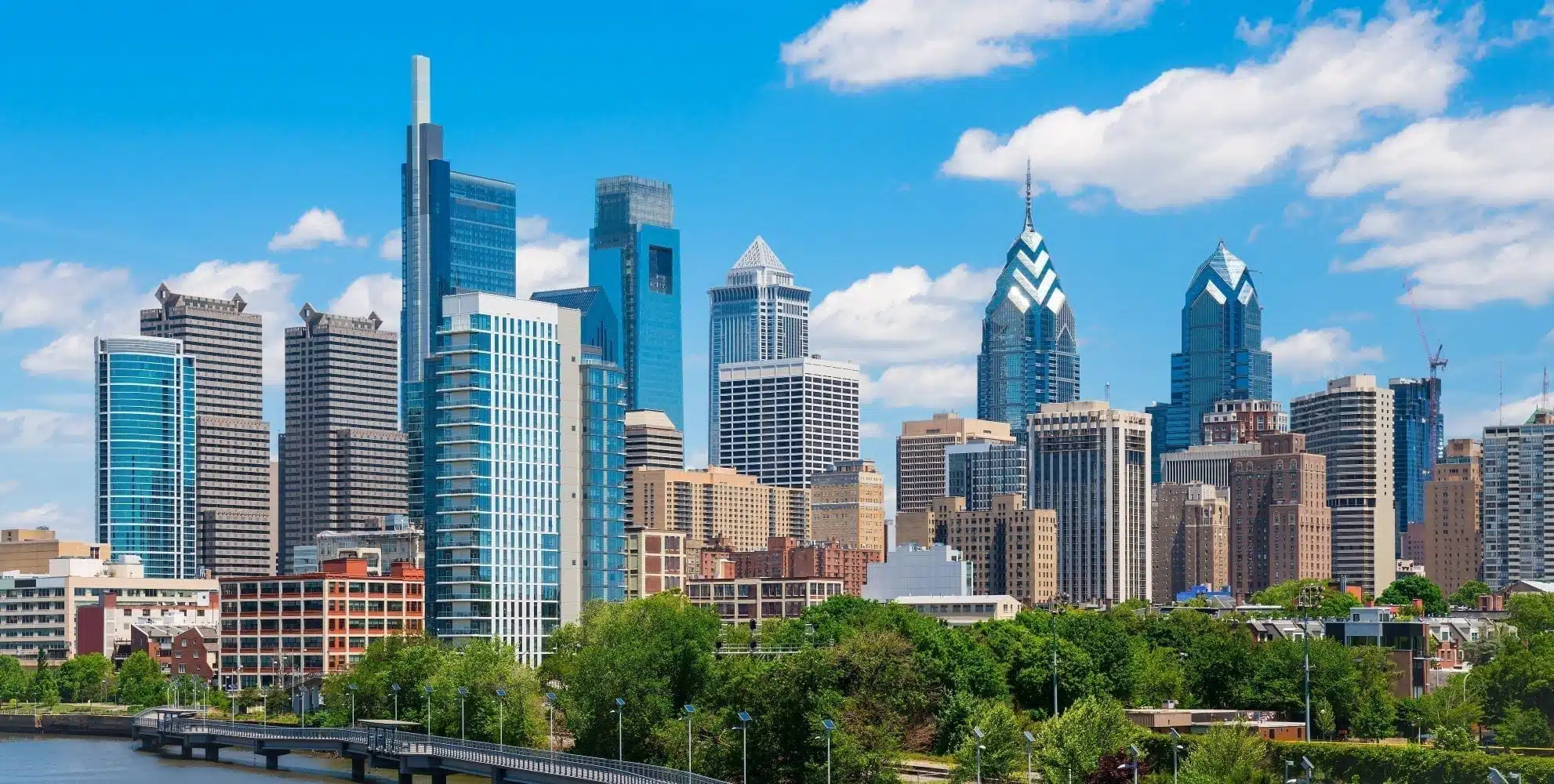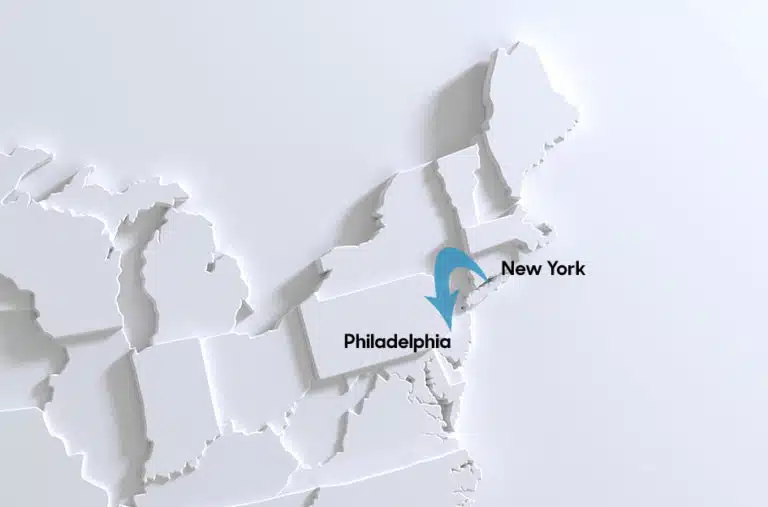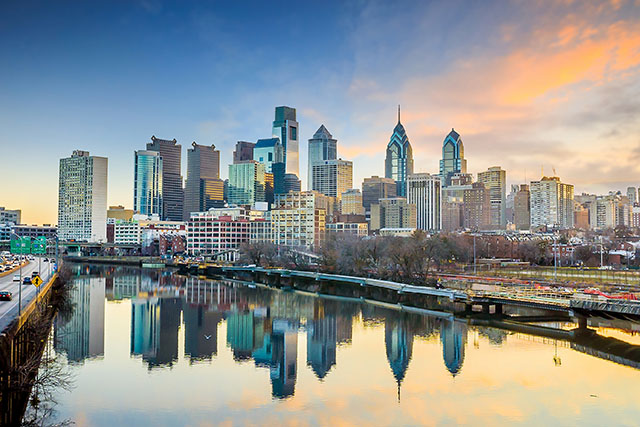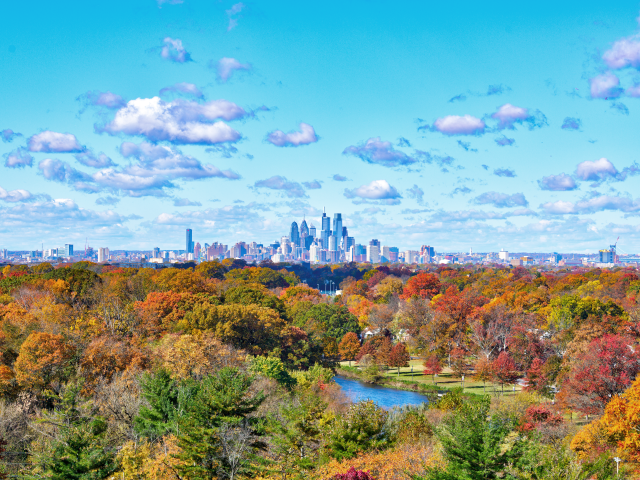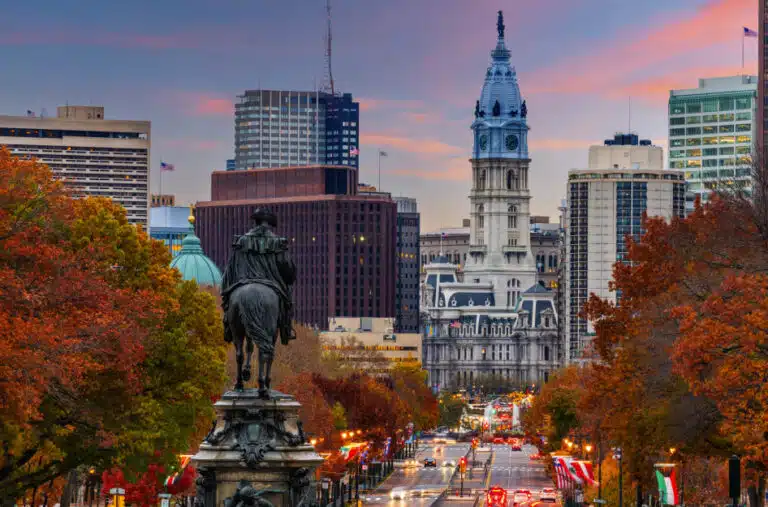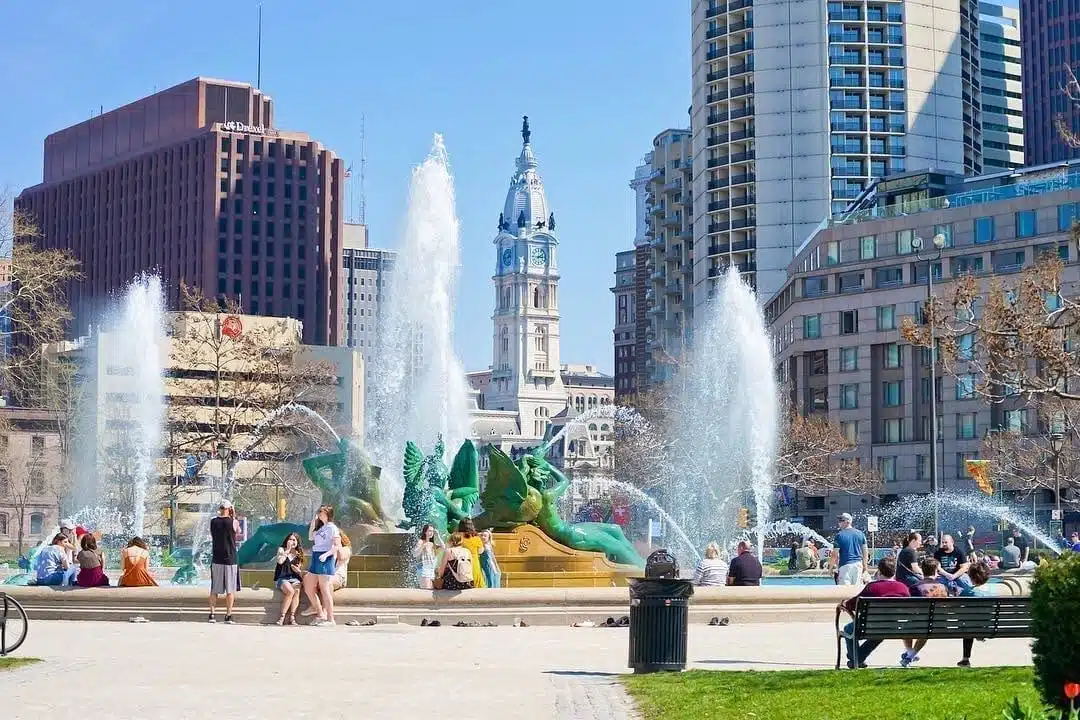The Pros and Cons of Living in Philadelphia
PhiladelphiaPennsylvania
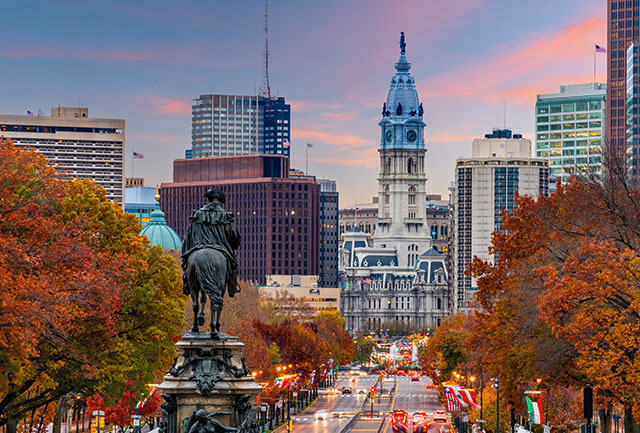
As one of the largest cities on the East Coast (and the entire country, for that matter), there’s a lot to like about the nation’s former capital — it’s the place where American independence first came to be, after all. However, before you pack your bags, it’s important to understand the pros and cons of living in Philadelphia. Here’s what you should know before you go.
| Planning a move to Philly? Start by getting a free moving quote from PODS. |
Fun Facts You Should Know About Philadelphia
- Philly was the nation’s capital from 1790 to 1800, prior to Washington, D.C., taking on the title.
- If you’re moving to Philly, you’re likely going to have a cheesesteak at some point. This iconic food has been a local staple since the 1930s.
- Philly is what some might call a “city of firsts.” It’s the birthplace of the country’s first hospital, first university, first library, and even the first zoo.
- The crack on the Liberty Bell is quite the sight to see, and it still remains a mystery as to how it got there!
- Philly holds the title of “Mural Capital of the U.S.,” and with over 3,500 found across Philadelphia.
- Philadelphia neighborhoods are eclectic and diverse, with 38 percent of residents being Black or African American and 16 percent Hispanic or Latino.
Living in Philadelphia Pros and Cons — FAQs
Q: Is Philadelphia a good place to live in 2025?
A: Yes — many people find living in Philadelphia appealing due to its culture, transit, and educational offerings. However, desirable neighborhoods tend to come with trade-offs like higher cost or safety concerns. It’s best to visit and explore neighborhoods firsthand to see if it “feels right” for you.
Q: What is a good salary to live comfortably in Philadelphia?
A: According to MIT’s Living Wage Calculator, a single adult living alone needs about $52,400 annually before taxes for basic needs in Philly. Using the 50/30/20 rule (50 percent needs, 30 percent wants, 20 percent savings), you’d ideally earn about $105,000 annually before taxes to live comfortably. For families with two children and two working adults, those numbers climb to $72,500 for basic living expenses, or $145,000 to fit the 50/30/20 rule.
Q: Why are people moving out of Philadelphia?
A: Some common reasons include concerns around crime, aging housing infrastructure, tax burdens, and school system quality. That said, many are also choosing to move into Philadelphia for its opportunity, culture, and central location in the Eastern U.S.
Q: What side of Philly is the safest to live on?
A: Is Philadelphia safe? The answer largely depends on where you choose to live. Center areas of Philadelphia consistently rank as safer based on crime statistics and community reports. Northeast Philadelphia, with neighborhoods like Bustleton, Somerton, and Pennypack Park, is often recognized for its low crime rates and family-friendly atmosphere. Northwest Philadelphia areas such as Chestnut Hill, Mount Airy, and Roxborough/Manayunk are known for strong community engagement and lower-than-average crime levels. Center City and nearby neighborhoods like Fairmount and Bella Vista tend to be safer pockets with easy access to downtown amenities. If you’re still on the fence about moving to the city, check out the pros and cons of living in Philadelphia.
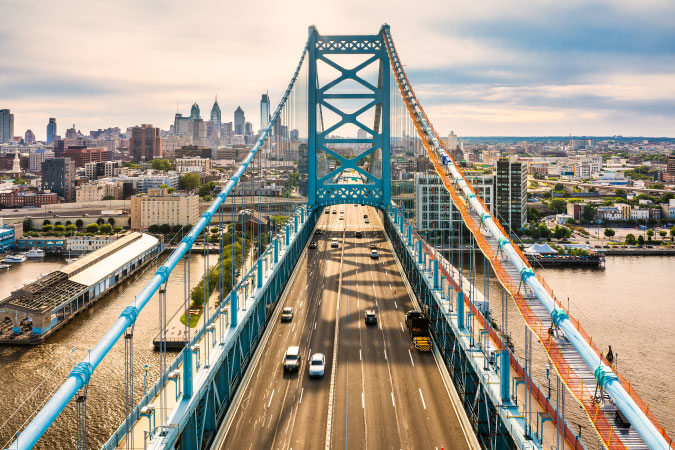
Philadelphia is situated in a prime East Coast location, with all of the desirable big-city amenities one could ask for.
12 Pros and Cons of Living in Philadelphia
Philadelphia is situated in a prime East Coast location, with all of the desirable big-city amenities one could ask for. From exploring the local art, history, and culture to dining at one of the city’s beloved local restaurants, the excitement never ends in the City of Brotherly Love.
But just like with any other major city, there are going to be disadvantages, and it’s important to take them into consideration. Here are a few of the biggest pros and cons of living in Philadelphia.
1. Pro: Philadelphia Offers Relatively Affordable Living for a Major Metro
Is Philadelphia expensive to live in? Philly’s cost of living index is 104.3, which is about 10.3 percent higher than the state average. That might seem steep, but it’s considered quite affordable, due to the city’s history and overall accessibility. Compared to nearby metros — like New York City, where the cost of living is 172.5 — Philly may seem like a retreat. Housing remains a mixed bag: Philly’s average home value sits at $232,400 — nearly $50,000 below the state average. Meanwhile, the city’s average rent sits at $1,875 for a one-bedroom and $2,300 for a two-bedroom.
2. Con: Philadelphia Still Struggles With Elevated Crime Levels
Is Philadelphia safe? Unfortunately, Philly doesn’t have a great reputation when it comes to crime statistics. While crime is decreasing, safety concerns persist. As of mid-2025, violent crime is down about 3.4 percent year-to-date, and property crime has dropped around 4.7 percent. Yet, the citywide total crime index sits at one, meaning it’s safer than just one percent of U.S. cities. Some of the most dangerous neighborhoods in the city include Wissinoming East, Germantown Morton, and Mayfair.
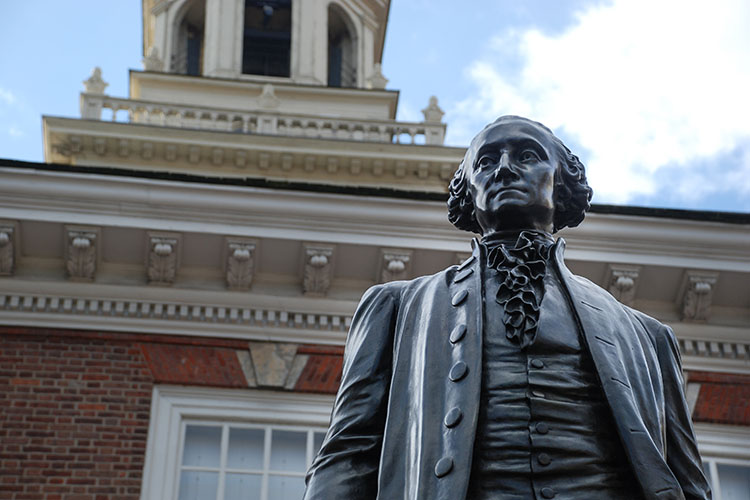
The iconic George Washington statue stands before Independence Hall as a symbol of freedom and a key landmark that highlights the history you’re surrounded by when living in Philadelphia.
3. Pro: Philadelphia Has Deep Historical and Cultural Roots
It’s no surprise that history buffs can have a field day in Philadelphia. First settled in 1682 by William Penn, Philly used to be one of the biggest ship-building centers on the entire East Coast. In 1776, the Declaration of Independence was signed at the Pennsylvania State House, which is now known as Independence Hall. Of course, the Liberty Bell is a popular site to visit in the city.
4. Con: Winters Can Be Bitter and Unpredictable in Philly
One of the key points when considering moving to Philadelphia is having access to history at your fingertips, right? Well, it might not be very comfortable to explore that history year-round. Most areas have impressive walk scores, making them easy to explore on foot, but winter combats those scores with icy sidewalks and freezing temperatures.
Like many northeastern cities, Philadelphia experiences freezing temps, icy sidewalks, and occasional snowstorms. These conditions can hamper walking tours, commuting, or simply enjoying the outdoors in cold months.
5. Pro: Job and Investment Interest Is Rising in Philadelphia
Philadelphia’s economy is heating up, thanks to a growing mix of industries and renewed investment across the metro area. From biotech and higher education to logistics and tech startups, the city is attracting new business and talent alike.
Recent housing and labor market data show Philadelphia ranking among the top five hottest housing markets in the country for 2025 — proof that people and companies are betting on its future. For professionals seeking opportunities in a more affordable big city, Philly’s upward trajectory makes it a solid place to plant roots.
For professionals seeking opportunities in a more affordable big city, Philly’s upward trajectory makes it a solid place to plant roots, highlighting it as a major advantage when weighing the pros and cons of living in Philadelphia.
6. Con: Philly’s Housing Costs Have Escalated Sharply
On the flip side, Philadelphia’s popularity comes with a price. In many neighborhoods, home values and rent prices have climbed steeply, especially in areas that were once considered budget-friendly.
Longtime residents have noted that even rowhouse communities and outer-ring suburbs are seeing bidding wars and higher property taxes. While the city still offers more affordable options than nearby metros like New York or D.C., the gap is narrowing.
For renters and first-time buyers, navigating the housing market now requires more strategy — and sometimes more patience — than it used to.

Philly has one of the best public transportation networks in the country — good news for those living in Philadelphia who rely on public transit to get around.
(Source: SEPTA via Facebook)
7. Pro: Public Transportation in Philly Is Strong and Expanding
When considering the pros and cons of living in Philadelphia, one clear advantage is the city’s reliable and far-reaching public transportation system. Those who rely on public transportation to get around will have an easy time navigating Philly, as the city has one of the best public transportation networks in the country. The system is operated by SEPTA, known for its efforts to reduce the impact on the environment.
Trains, subways, buses, and trolleys are all means of public transportation in Philly. The rail network is a part of the Northeast corridor, the subway system has two lines, and the buses span over 100 routes. Increasing investments are being made to modernize aging infrastructure and expand service. Philadelphia’s 2025 state-of-
8. Con: Philadelphia Liquor Sales Rules Are Unusual and Restrictive
If you’re moving to the state of Pennsylvania for the first time, you may be surprised to know that liquor licenses are difficult to obtain. As a result, many restaurants in the city are completely BYOB (Bring Your Own Beer). If you’re looking to buy wine and liquor, you can only do so at state-owned wine and spirits stores, while you can travel to a local distributor to get beer.

You can find much more than cheesesteaks in Philly’s food scene.
(Source: Suraya via Facebook)
10. Con: Public Schools in Philly Vary Widely in Quality
With an affordable cost of living and convenient amenities all around the city, Philly is a hotspot for families. However, the public school system in Philly is not among the best overall, and it can be challenging to ensure a good education for your children. There are great schools depending on the neighborhood you choose, though, so be sure to conduct plenty of research before making your final decision.
If you’re on the hunt for higher education opportunities, however, you’re in luck. With renowned universities — including Drexel University and the Ivy League University of Pennsylvania — just a few subway stops from one another, you won’t have to look very hard. Temple University is also just a 15-minute commute from Center City.
11. Pro: Social and Economic Trends Are Improving
For years, Philadelphia struggled with high poverty rates and uneven public services. But recent data suggests things are changing. According to the U.S. Census Bureau, the city has officially shed its title as the “poorest big city” in America — a major milestone. Economic revitalization projects, along with steady improvements in education and community safety, are helping create new momentum across neighborhoods. While there’s still work to be done, residents are starting to feel more optimistic about the city’s direction and its investment in public well-being.
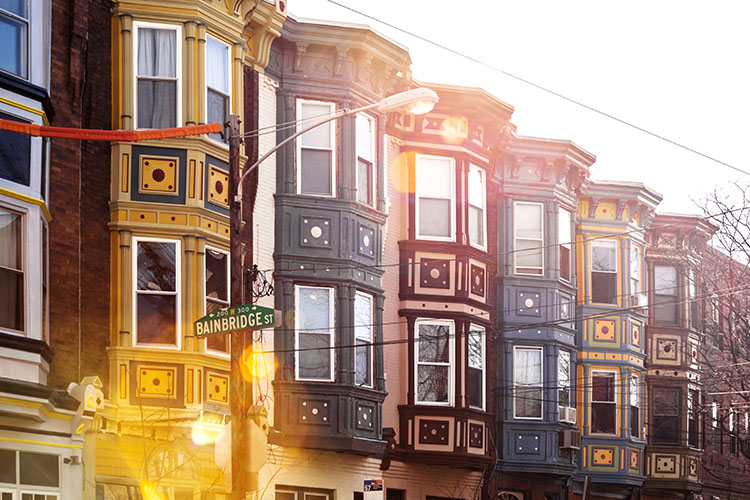
Philadelphia’s iconic row homes reflect the city’s character, and they’re one of the many reasons living in Philadelphia appeals to those who value history and community.
12. Con: Detached Homes Are Rare in Many Philly Districts
Row houses are an architectural staple in many major cities across the Northeast, including Baltimore, New York City, Washington, D.C., and — you guessed it — Philadelphia. However, because these homes are attached, you’ll be sharing walls with your neighbors. If you’re moving from the suburbs, this is going to take some adjustment.
Recap: Pros and Cons of Living in Philadelphia
Is Philadelphia a Good Place to Live? Here’s a quick recap of the 12 key takeaways above. Use this list to weigh what matters most to you:
Pros of Living in Philadelphia:
- Relatively affordable living for a major metro
- Deep historical and cultural roots
- Job and investment interest is rising
- Public transportation is strong and expanding
- Food scene is diverse and vibrant
- Improving social and economic trends
Cons of Living in Philadelphia:
- Crime levels are still elevated
- Winters can be bitter and unpredictable
- Housing costs have escalated sharply
- Liquor sales rules are unusual and restrictive
- Public schools vary widely in quality
- Detached homes are rare in many districts
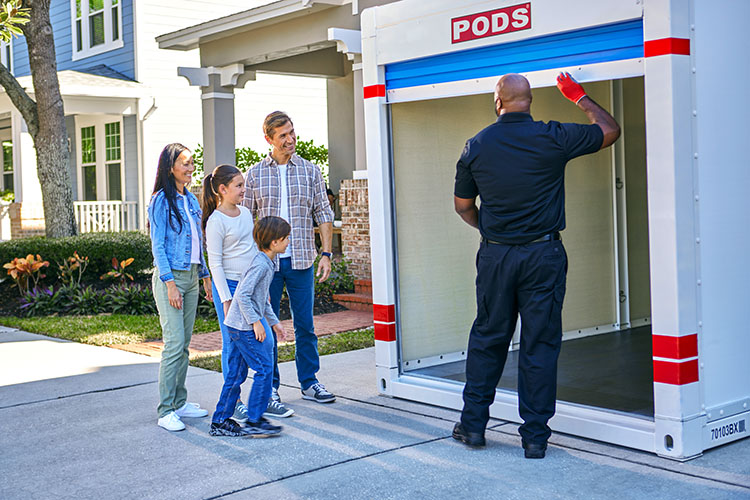
Make your move to Philadelphia flexible with a PODS portable moving container delivered right to your driveway.
Use PODS for Your Philadelphia Move
Once you’ve weighed the pros and cons of living in Philadelphia, you’ll want a moving solution that adapts to your timeline — not the other way around. Make your move to Philadelphia flexible with PODS portable moving containers delivered right to your driveway. One month of storage is included in the cost of every move, so whether you need extra time before settling into your new Philadelphia home or want to stage your current one, you’ll have built-in breathing room. Need an extra hand with packing, loading, or carrying heavy furniture? PODS can refer you to trusted local packing and loading professionals to help handle the heavy lifting.
PODS City Service is available for moves in and out of Philadelphia. Visit PODS online for a free local moving quote or call 877-350-7637 for long-distance moving.
Editor’s note: For ease of reading, monthly rental prices were rounded to the nearest $25 and home values were rounded to the nearest $100. Home values in the millions were rounded to the nearest $100,000.
*This article was written on behalf of PODS Enterprises, LLC (“PODS”). PODS does not warrant the completeness or accuracy of any information contained in this article and disclaims any liability for reliance upon the content herein.

Your quote in 60 seconds
Get pricing tailored to your needs!


